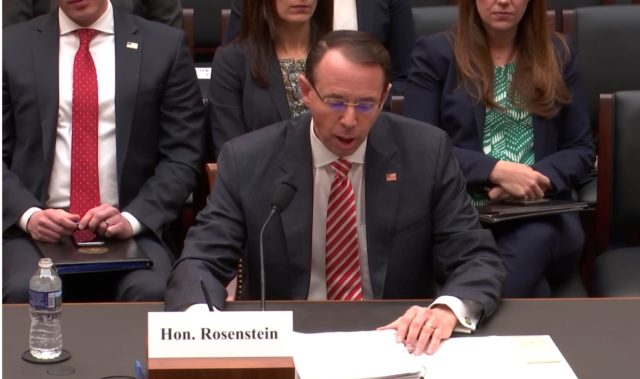Rosenstein under fire for remarks he claims he didn’t say but should have
BALTIMORE – When Rod Rosenstein worked in this city, as U.S. attorney for the state of Maryland, he had a solid professional reputation that seems lately to have gone dramatically awry.
Back then, he was a Republican serving in one of the bluest Democratic states in America, in a city overwhelmingly Democratic. He went after crooked cops, and prison guards conspiring with gangs, and big-time drug dealers.
And nobody questioned his political leanings, and nobody questioned his integrity.
But now we have people all over America, and particularly in Washington, questioning remarks Rosenstein allegedly made about Donald Trump and this president’s ability to hold office, and whether Rosenstein, the deputy U.S. attorney general, was serious or merely sarcastic when he allegedly made these remarks.
To all of this, we have a concise response:
Who cares?
Kidding or not, he was on the mark.
(And, before we get any further, let’s note two things: Rosenstein denies making such remarks. And The New York Times, which reported this last Friday, stands by the story.)
According to The Times, Rosenstein privately proposed “secretly recording President Trump in the White House to expose the chaos consuming the administration, and he discussed recruiting cabinet members to invoke the 25thamendment to remove Trump from office for being unfit.”
The Times says Rosenstein made these remarks in the spring of 2017, “when the firing of (FBI chief) James Comey plunged the White House into turmoil. Over the ensuing days, Trump divulged classified information to Russians in the Oval Office, and revelations emerged that Trump had asked Comey to pledge loyalty and end an investigation into a senior aide.”
To which we say: if Rosenstein did not make such remarks, whether jokingly or not – he should have. And he shouldn’t find himself so alone, and so vulnerable, at such a moment in history.
This is a president who has set new records for instability of all manner, political and emotional.
Remember, Rosenstein allegedly made these remarks in the spring of 2017. At that time, Trump was only getting started. In the ensuing months, this president has behaved in a manner, as the distinguished historian Garry Wills recently wrote, befitting “tyrants.”
In a New York Review of Books piece headlined, “Resistance Means More than Voting,” Wills notes President Trump’s “co-option of the justice system…his declaring all major press outlets except the propaganda arm of the administration to be ‘enemies of the people…’ branding Muslims as ‘animals’ as Hitler did the Jews…the personal rescinding, achieved or attempted, of major pacts reached by national diplomacy – from the Paris Accords to NATO to NAFTA to TPPA…”
Wills’ list (and, if we’ve been paying attention, our own) goes on to include Trump “declaring all agencies of government not originated by the dear leader as remnants of a ‘deep state…’ calling some self-proclaimed Nazis ‘good people…’ using the machinery of the state for enrichment of the leader and his family…multiple steps to limit the ability to vote.”
Some of these Trumpian abuses are surely being examined right now by special counsel Robert Mueller, as an outgrowth of the Russia investigation – an investigation overseen by Rosenstein.
In the clamor over his alleged remarks about Trump, Democrats are worried the president might fire Rosenstein, bring in a new deputy attorney general who might then limit or end the Mueller probe, and thereby keep this president safe no matter what outrages he’s committed.
What an irony, if this Republican president were to find safety based on alleged remarks made by a Republican, Rosenstein, overseeing another Republican, Mueller – both of whom believe simple facts to be more important than political party – and both vulnerable to a president who places himself above all things: not only his party, but his country.

Michael Olesker, columnist for the News American, Baltimore Sun, and Baltimore Examiner has spent a quarter of a century writing about the city he loves.He is the author of several books, including Michael Olesker’s Baltimore: If You Live Here, You’re Home, Journeys to the Heart of Baltimore, and The Colts’ Baltimore: A City and Its Love Affair in the 1950s, all published by Johns Hopkins Press.

